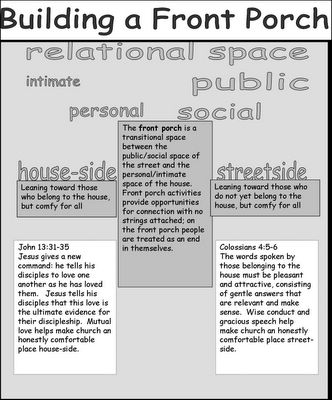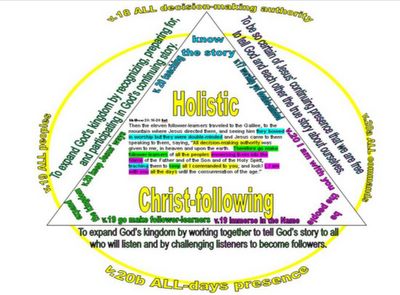
cover page
Table of Contents
Some Basics
Who We Are and Why We’re Here
Learning Culture: Tangent Surfing
Gift-Skills-Passions Assessment
TFB College Leadership Team
Leadership Application/Evidence Report
Some Basics
eNews: http://torrancefirstyam.blogspot.com/
Pix: http://www.flickr.com/photos/90938647@N00/tags/tfbcollege/
What goes on:
- Sunday mornings, 11am: Sunday Gathering--a teaching time led primarily by collegians (1 hour total).
- Tuesday nights, 7:30 pm: Thursday Gathering--guided by a teacher-facilitator and often resembles Mr. Toad’s wild ride, but with bibles.
- Fourth Sunday, 11am: The Church Has Left The Building (ministry in the neighborhood) and EAT! (lunch at a local restaurant).
- Yearly: College Briefing at Forest Home
Get up-to-date info in the online newsletter (http://torrancefirstyam.blogspot.com); it's also a place where you can participate and “distance learn” if you are not in the Torrance area.
Leadership is provided by college ministry staff and the student leadership team.
Staff:
Pastor G (TFB Youth Min Pastor) gbenjamin49@gmail.com
Laura (teacher, AKA the mad tangent rider; eNews editor) lkspringer@gmail.com
Leadership team:
TBA
Who We Are and Why We’re Here
The goal of the TFB college ministry is to guide collegians to know the story, be the people, and expand the kingdom.
Know the story. The story is much more than a timeline or a series of bible lessons. It begins with everything in the Bible, and includes all we do in God’s Kingdom. Knowing the story is understanding the truth about life this side of eternity and the truth about God’s work in the world.
Be the people. Follower-learners today are part of the people of God that includes all follower-learners of all times and places. The people of God are unified not by their similarity to each other but by their relationship to God in Christ by the Spirit. So, in the people of God unity is primary, diversity is celebrated, and division is unthinkable.
Expand the kingdom. The kingdom expands when follower-learners go deep, becoming more and more like Jesus. The kingdom expands when follower-learners go wide, telling the story to all who will listen and challenging listeners to become follower-learners.
Three intentions flow from these understandings.
We intend to be so certain of Jesus’ continuing presence that we are free to tell God and each other the true story about ourselves.
We intend to expand God’s kingdom by recognizing, preparing for, and participating in God’s continuing story.
We intend to expand God’s kingdom by working together to tell God’s Story to all who will listen and challenging listeners to become followers.
The following chart summarizes the TFB College Ministry goals and intentions.

Goals and Intentions
Learning Culture: Tangent Surfing
Most learning in the TFB College Ministry is by tangent surfing. Another name for tangent surfing might be ‘discussion’, but compared to ‘tangent surfing’ that simply sounds much too droll. The chart below explains the basics of tangent surfing, but for those who prefer words:
The first key to tangent surfing is to ensure that the main point has sufficient gravitational force. The main point has sufficient gravitational force when it is compelling, challenging, and intentionalized.
Basically, tangent surfing leverages distractions by using them to obtain alternate perspectives of the main topic. Tangents do not include side talk and interruptions. Both of these are disrespectful and rude, and members are expected to hold each another accountable. Tangents are parallel ideas, clarifying questions, and side road explorations.
The second key to tangent surfing is listening. Listening is an important show of respect for others. It honors them and their ideas. It is also absolutely necessary. In a group of five, each person should be listening 80% of the time. That’s a lot of listening, and listening is tough.
Now, all this explanation only scratches the surface. Practice brings true understanding, and even then it is a work in progress.

Tangent Surfing
Gift-Skills-Passions Assessment
We encourage everyone to complete an assessment; those in leadership must complete an assessment and meet with staff in the first month of participation.
1) Spend some time in prayer.
a) Thank God for making you in his image and for gifting you to do his work2) Write out short stories or descriptions in answer to the following.
b) Ask him to help you to remember and to think clearly as you work through the questions.
a) What are some things you enjoy doing?
b) What can you talk about for hours without being bored?
c) What do others say you do well?
d) What are some of your accomplishments that have produced great satisfaction?
e) What things do people seek your help on?
f) What have you done that helped others be more like Jesus?
3) Read through your stories and descriptions. What trends do you notice?
4) Spend some time in prayer.
a) Tell God what you’ve found.
b) Thank him for those gifts, skills, and passions.
c) Ask him for wisdom to know how he wants to use them.
Once you have worked through the assessment, meet with a college staff person to share what you have discovered and to think through how you might practice and develop your gifts, skills, and passions.
TFB College Leadership Team
Why a leadership team? First, the TFB College ministry is not run by staff (though the staff participate as part of the leadership team). Second, and more importantly, God called us all into community to walk together in the way of Jesus. We have a leadership team because it is a very important way that we walk together.
As in any organized group of humans, certain tasks must be done. Leadership does not revolve around these necessary tasks, though, but around the gifts, skills, and passions that staff and leaders bring to the team. The gifts, skills, and passions assessment in this handbook can help you determine how you can serve.
Relationship is the core of leadership, so students should be members of TFB College Ministry for three months before applying for leadership. This gives the group time to know the individual and the individual time to know the group.
Another important part of relationship is participation. Those on the leadership team are expected to participate in a College Ministry small group and the Sunday Collegium. Also, leaders should participate in at least one-third of activities outside of Collegium and small groups.
Leaders help others participate by gathering task teams to carry out ministry. Many must belong before they can believe, and a good way to introduce people to Jesus is to live life in front of them. Ministry is one way to do that. Everyone, including those who have not decided to trust and follow Jesus, are encouraged to participate in tasks that do not involve direct, person-to-person ministry. We limit the participation of those who have not decided to trust and follow Jesus, because knowing the story, being the people, and expanding the kingdom is central to our ministry. All who have decided to trust and follow Jesus may participate in person-to-person ministry.
Team members agree to a specific length of service and early departure from the agreed-upon term results in team-agreed consequences.
The leadership team meets monthly for about one hour. The normal agenda is as follows:
Prayer and devotional
Evaluation: How well are we meeting our intentions?
As individualsDreaming and planning (at least three months in advance)
As staff
As a leadership team
As a ministry: People and Programs
Leadership Application/Evidence Report
If you are interested in joining the leadership team, you must provide an evidence report. The report should be a typed, double-spaced, 12-point font, one-inch margin paper with good grammar and spelling. The report will be prayerfully considered by the college leadership and staff.
1) In one page or less, describe your current God story.
2) In about a half-page, evaluate how well you think the college ministry is living out our three intentions.
i) To be so certain of Jesus’ continuing presence that we are free to tell God and each other the true story about ourselves.3) Provide evidence of your leadership and followership. Coaching can take place in many areas of life, not just in church. Describe the type of coaching and how long you have been involved.
ii) To expand God’s kingdom by recognizing, preparing for, and participating in God’s continuing story.
iii) To expand God’s kingdom by working together to tell God’s Story to all who will listen and challenging listeners to become followers.
a) Someone you are coaching.4) List one fellow collegians and describe that individual's gifts, skills, and passions.
b) Someone who is coaching you.
5) For each of the following, write one questions that you think the church must answer. (Note: this is NOT a test, so relax.)
a) Holy Spirit
b) Christ
c) Salvation
d) Church
6) In a half page or less, describe how you interact with the bible.
a) How?
b) How often?
c) Why?
7) Describe any TFB participation beyond the college group
8) It is important to have a good reputation in the local church. Please provide the name and contact information of a non-college ministry, non-family TFBer. They will be asked one question, "What qualifies ______________ for participation in the TFB College Ministry leadership team?"
9) Who helped you gather this evidence? At the end of your evidence report, fill in this sentence: “Thank you to ___________________ for helping me gather my evidence.
10) [NOTE: this item may be completed later] Complete the Gifts-Skills-Passions Assessment and meet with staff in the first month of your participation on the team.
a) Which do you think needs developing?
b) Agree to read one ministry book this year and write a one-page response paper (summary, impact on you, and plans for further development).




